
 THE NETHERLANDS
THE NETHERLANDS
FACTS
NEWS
BEHAVIOUR
RULES
FOREIGNERS
IMPRESSIONS
BOOKS
INTERNET

|
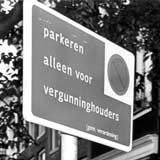 |
Parking The 'permit-holders only' sign means that you are only allowed to park your car if you have a permit for that particular street.
Photograph Nationaal Foto Persbureau
|
|
Wheel clamp Introduced in the Netherlands in the early 1990's. Used to disable illegally parked cars, they are mostly found in the major cities.
Photograph Vincent Mentzel
|
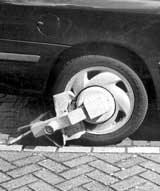
|
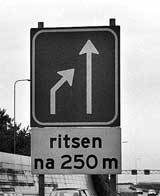 |
Zip here Motorway traffic sign found in places where the carriageway narrows. Drivers must merge in turn like the notches of a zip.
Photograph Jørgen Krielen
|
|
Car-share Under this innovative scheme, several people have the keys to a car. You register with a central computer when you want to use the car, after which you have to return it to the same place.
Photograph Jørgen Krielen |
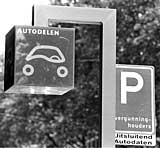
|
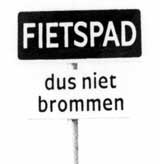 |
Bicycle lane Cyclists have many rights and obligations on the road but they also often have their own bike lanes. No mopeds allowed.
Photograph Leo Vogelzang
|
|
Bicycle removal Station squares are major gathering points for bicycles. Warning signs are placed at stations to enable the authorities to remove bicycles that are placed outside the racks.
Photograph Dijkstra |
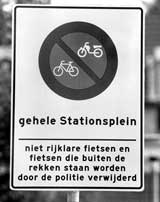
|
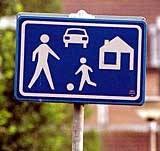 |
Residential area A woonerf is a resident-friendly street in which all traffic must slow to a crawl (15 km/h), traffic from the right has priority and pedestrians have priority over everyone else.
Photograph Jørgen Krielen
|
|
Train taxi Rail travellers who show their train ticket in minor towns are entitled to take a taxi for only 7 guilders. The taxi does not leave until it has sufficient passengers or until fifteen minutes have elapsed.
Photograph Jørgen Krielen |
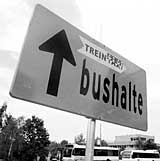
|
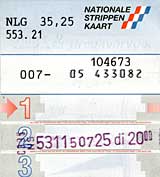 |
Bus, tram and metro card Ticket used for travel on busses, trams, metros and (in some cases) trains in the Netherlands. Each 'strip' represents a certain distance and period of time. The cards come in various shapes and sizes.
|
|
'Do you want to sit down? I'll stand!' A slogan often seen on public transport. Young travellers are strongly encouraged to make way for elderly or infirm travellers who cannot find a place to sit.
Photograph Jørgen Krielen |
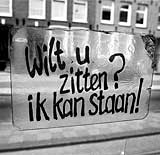
|
 |
You can use your chip card here The concept of paying for purchases using a chipknip or chipper, two rival 'electronic wallet' systems, is not really catching on in the Netherlands.
Photograph Jørgen Krielen
|
|
Disclaimer The management is not responsible for.. A warning from the management in public facilities, disclaiming responsibility for lost or stolen property.
Photograph Jørgen Krielen |
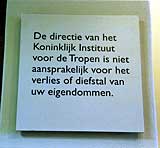
|
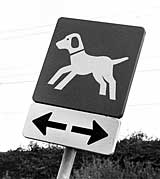 |
Dog litter place Traffic sign in cities. Faced with insufficient open spaces in cities, the authorities have designated certain places where dogs are allowed to answer calls of nature.
Photograph Jørgen Krielen
|
|
Yes/no sticker People who do not want to receive unsolicited mail can place a yes/no sticker on their letterbox. Mailmen and advertising deliverymen both respect this.
Photograph Jørgen Krielen |
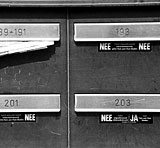
|
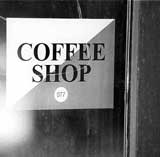 |
Official identification sign for coffee shops, where soft drugs are sold. There are about 1200 in the Netherlands, the majority of them in the major cities.
Photograph Jørgen Krielen
|
|
Amsterdammertje Anti-parking bollard in central Amsterdam. Sporting the three crosses of the city insignia, they are often ignored and can cause thousands of guilders of damage to car doors.
Photograph Willem Middelkoop |
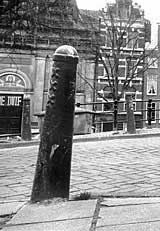
|
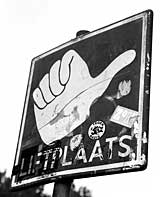 |
Hitchhike spot To prevent hitchhikers standing by the side of motorways, these signs indicate places where cars can stop safely.
Photograph Jørgen Krielen
|

|
NRC Webpagina's
6 juli 2000

|


